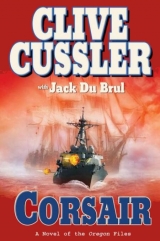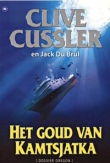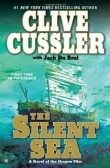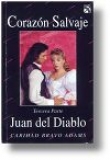
Текст книги "Corsair"
Автор книги: Clive Cussler
Жанр:
Морские приключения
сообщить о нарушении
Текущая страница: 2 (всего у книги 27 страниц)
“He was once a holy man, right?”
“Up until a few years ago,” Decatur agreed. “He was what the Muslims called an Imam. Kind of like a priest. Such was his hate for Christendom that he decided preaching wasn’t enough, and he took up arms against any and all ships not flying a Muslim flag.”
“I heard tell that he takes no prisoners.”
“I’ve heard the same. The Bashaw can’t be too happy about that since prisoners can be ransomed, but he holds little sway over Al-Jama. The Bashaw made a deal with the devil when he let Al-Jama occasionally stage out of Tripoli. I’ve also heard he has no end of volunteers to join him when he goes raiding. His men are suicidal in their devotion to him.
“Your rank-and-file Barbary pirate sees what he is doing as a profession, a way to make a living. It is something they’ve been doing for generations. You saw tonight how most of them fled the Philadelphiaas soon as we boarded. They weren’t going to get themselves killed in a fight they couldn’t win.
“But Al-Jama’s followers are a different breed altogether. This is a holy calling for them. They even have a word for it: jihad. They will fight to the death if it means they can take one more infidel with them.”
Henry thought about the big pirate who had come at him relentlessly, battling on even after he’d been shot. He wondered if he was one of Al-Jama’s followers. He hadn’t gotten a look at the man’s eyes, but he’d sensed a berserker insanity to the pirate, that somehow killing an American was more important to him than preventing the Philadelphiafrom being burned.
“Why do you think they hate us?” he asked.
Decatur looked at him sharply. “Lieutenant Lafayette, I have never heard a more irrelevant question in my life.” He took a breath. “But I’ll tell you what I think. They hate us because we exist. They hate us because we are different from them. But, most important, they hate us because they think they have the right to hate us.”
Henry remained silent for a minute, trying to digest Decatur’s answer, but such a belief system was so far beyond him he couldn’t get his mind around it. He had killed a man tonight and yet he hadn’t hated him. He was just doing what he’d been ordered to do. Period. It hadn’t been personal and he couldn’t fathom how anyone could make it so.
“What are your orders, Captain?” he finally asked.
“The Intrepid’s no match for the Saqr, especially as overcrowded as we are. We’ll link up with the Sirenas we planned, but rather than return to Malta in convoy I want you and the Sirento stay out here and teach Suleiman Al-Jama that the American Navy isn’t afraid of him or his ilk. Tell Captain Stewart that he is not to fail.”
Henry couldn’t keep the smile off his face. For two years, they had seen little action, with the exception of capturing the Intrepidand now burning the Philadelphia. He was excited to take the fight to the corsairs directly.
“If we can capture or kill him,” he said, “it will do wonders for our morale.”
“And severely weaken theirs.”
AN HOUR AFTER dawn, the lookout high atop the Siren’s mainmast called down, “Sail! Sail ho! Five points off the starboard beam.”
Henry Lafayette and Lieutenant Charles Stewart, the ship’s captain, had been waiting for this since sunup.
“About damned time,” Stewart said.
At just twenty-five years of age, Stewart had received his commission a month before the Navy was officially established by Congress. He had grown up with Stephen Decatur, and, like him, Stewart was a rising star in the Navy. Shipboard scuttlebutt had it that he would receive a promotion to captain before the fleet returned to the United States. He had a slender build, and a long face with wide-apart, deep-set eyes. He was a firm but fair disciplinarian, and whatever ship he served on was consistently considered lucky by its crew.
Sand in the hourglass drizzled down for ten minutes before the lookout shouted again. “She’s running parallel to the coast.”
Stewart grunted. “Bugger must suspect we’re out here, number one. He’s trying to end around us and then tack after the Intrepid.” He then addressed Bosun Jackson, who was the ship’s sailing master. “Let go all sails.”
Jackson bellowed the order up to the men hanging in the rigging, and in a perfectly choreographed flurry of activity a dozen sails unfurled off the yards and blossomed with the freshening breeze. The foremast and mainmast creaked with the strain as the two-hundred-and-forty-ton ship started carving through the Mediterranean.
Stewart glanced over the side at the white water streaming along the ship’s oak hull. He estimated their speed at ten knots, and knew they would do another five in this weather.
“She’s spotted us,” the lookout shouted. “She’s piling on more sail.”
“There isn’t a lateen-rigged ship in these waters that’s faster than us,” Henry said.
“Aye, but he draws half the water we do. If he wants, he can stay in close to shore and beyond the range of our guns.”
“When I spoke with Captain Decatur, I had the impression this Suleiman Al-Jama isn’t afraid of a fight.”
“You think he’ll come out to meet us?”
“Decatur thinks so.”
“Good.”
For the next fourteen hours, the Sirendoggedly pursued the Saqr. With a greater spread of canvas, the American brig was several knots faster than Al-Jama’s raider, but the Arab captain knew these waters better than anyone. Time and again he would lure the Sirendangerously close to shoals and force her to tack off the chase in search of deeper water. The Saqralso managed to find stronger winds close to the shore, winds driven off the searing desert beyond the cliffs that towered over the coastline in unending ramparts.
The gap between the ships noticeably shrank when the sun started to set and the inshore breeze slowed.
“We’ll have him within the hour,” Stewart said, accepting a glass of tepid water from his cabin steward.
He surveyed the open gun deck. Crews were standing by their cannons, the keen edge of expectation in their eyes. Shot and powder charges were laid in and at the ready, though not too much in case a gun took a direct hit. Powder monkeys—boys as young as ten—were ready to scamper back and forth to the magazine to keep the weapons fed. Men were aloft in the rigging, ready to alter sail as the battle dictated. And pairs of Marine marksmen were making their way to the fighting tops on the foremast and mainmast. Two were brothers from Appalachia, and while no one on the crew could understand them when they spoke they both could load and shoot four times a minute and score bull’s-eyes with all four shots.
Two white plumes suddenly obscured the Saqr’s fantail, and a moment later came the boom of the shots. One ball landed fifty yards off the Intrepid’s port bow while the other landed well astern.
Stewart and Lafayette looked at each other. Henry gave voice to their mutual concern. “Her stern chasers are long guns. Double our range at the very least.”
“Mr. Jackson, come about to port ten degrees,” Stewart ordered, to throw off the Saqr’s gunners. “Standing order for a similar maneuver with every shot fired. Turn toward where the closest ball falls.”
“And your orders if we’re hit?” the big bosun asked before he could stop himself.
Stewart could have had Jackson lashed for such an insolent comment; instead, he said, “Dock yourself a day’s pay, and hope we have more ship than you have salary.”
The wind close to shore suddenly died. The Saqr’s large triangular sails lost tension and flapped uselessly while those aboard the Intrepidremained taut. They came in astern of the pirate ship at a slight angle, so as to avoid her aft guns. At a hundred and fifty yards, three of the Saqr’s cannons fired, blowing a wall of smoke over the corsair’s flank that completely hid her from view. Two rounds went high, while the third struck the Siren’s hull but didn’t penetrate.
Stewart remained silent, closing the distance, increasing his chances of a hit with each foot gained. He saw they weren’t yet targeted by any of the other guns, so he waited until the Arab crew was running out the weapons they had just cleaned and reloaded.
“Fire as you bear!”
Four carronades went off with one throaty roar that beat in on Henry’s chest as if he’d been kicked. The bow was enveloped in smoke that whipped along the length of the Intrepid’s hull as she charged the Saqr. On the fighting tops, the Marines were busy with their muskets, picking off pirates on the Saqr’s deck who thought they were invisible behind the ship’s railings.
Two more cannons roared before anyone could see if their first salvo scored. The Saqrresponded with a raking broadside that had been perfectly aimed. One ball smashed a carronade with a lit fuse, knocking the weapon on its side as it fired. That ball hit the adjacent gun crew, killing two men and maiming another. Bags of powder burned like incandescent flares. Another of the Saqr’s shots smashed the Intrepid’s mainmast, though not enough to topple it, while others ripped needle-sharp splinters from the bulwarks with enough velocity to run a man through.
“Mr. Jackson,” Stewart shouted over the sounds of battle, “take some sail off the mainmast before we lose it entirely. Mr. Lafayette, take charge up on the bow. Get those fires out and the carronades sorted.”
“Aye, aye, sir.” Henry threw a quick salute and raced for the bow as musket fire from the Saqrraked the decks.
He looked over to see a fire raging on the Barbary ship. The Intrepidwas giving as good as she got. He could see one figure shouting orders, not in a panicked way but with a calm that belied the situation. He wore clean white robes and had a contrasting dark beard shot through with two lines of white whiskers falling from the corners of his mouth. His nose was large and so heavily hooked it could almost touch his upper lip.
Suleiman Al-Jama must have felt the scrutiny, because he chose that moment to look across at the American ship. At a hundred yards, Henry could feel the hatred radiating off the man. A fresh blast from the guns obscured the pirate captain for a moment, and Henry had to duck as the railing behind him burst apart. When he looked again, Al-Jama was still staring.
Henry looked away.
He reached the bow and quickly organized a bucket brigade to douse the flames. The one carronade that had been hit was destroyed, but the gun next to it was in good order. Henry took command of it himself. The teenage midshipman who had been in charge of this section of guns was burned beyond recognition.
He aimed the loaded gun and touched the fuse with a length of smoldering slow match. The gun bellowed, sliding back on its guide rails in the blink of an eye. Lafayette had men swabbing the barrel before he checked the Saqrfor damage. Their ball had hit next to one of the gunports, and through the hole it had blown into the wood he could see that men were down, writhing in agony.
“Reload!”
At nearly point-blank range the two ships pounded on each other like prizefighters who don’t know when to quit. It was getting darker now, but they were so close that the crews could aim using the glow of the fires that flashed and ebbed.
The weight of shot from the Saqrbegan to die down. The Americans were destroying her cannons one by one. And when no return fire came from the Tripolian vessel for nearly a minute, Stewart ordered the Sirenin tighter.
“Boarding parties at the ready.”
Sailors took up grappling hooks to bind the two ships fast, while others passed out pikes, axes, and swords. Henry checked the priming pans of the two pistols tucked into his belt and drew his cutlass.
Pushing a swell of white water off her bow, the Sirencharged the Saqrlike a bull, and when the ships were a dozen feet apart the hooks were thrown. The instant the hulls smashed into each other, Henry leapt across to the other ship.
No sooner had his feet touched the deck than a series of blistering explosions raced along the length of the pirate vessel. Her cannons hadn’t been silenced at all. They had pretended to be unarmed to lure the Sirenin close. Twelve guns poured their shot into the American brig, raking the line of men at her rail. Stewart had to veer off sharply. Sailors hacked at the grappling ropes in a desperate bid to get free.
Seeing his shipmates cut down like that pained Henry as if it were his own flesh torn apart. But he didn’t have time to jump back aboard before his ship had put twenty feet between herself and the pirate vessel. He was trapped on the Saqr. Musket balls from the Marines whined over his head.
The Arabs manning the Saqr’s guns hadn’t noticed him leap. The only course open to Henry was to jump into the sea and pray he was a strong enough swimmer to reach the distant shore. He started creeping for the far rail and had almost made it when a figure suddenly loomed above him.
He instinctively went on the charge before the man could fully comprehend what he was seeing. Henry pulled one of his pistols with his left hand and fired an instant before his shoulder collided with the man’s chest.
As they tumbled over the railing, he recognized the distinctive white streaks in the other man’s beard: Suleiman Al-Jama.
They hit the bath-warm water tangled together. Henry broke the surface to find Al-Jama next to him, gasping to fill his lungs. He was thrashing wildly, but oddly, too. It was then that Henry noticed the dark stain on the otherwise white robe. The ball from his pistol had hit the captain at the shoulder joint, and he couldn’t lift that arm.
Looking quickly, he saw the Saqrwas already fifty feet away and was again trading broadsides with the Siren. There was no way anyone on either ship could hear Henry shouting, so he didn’t bother.
Al-Jama’s efforts to keep his head above water were growing weaker. He still couldn’t get his lungs to reinflate, and his heavy robes were dragging him under. Henry had been a strong swimmer his entire life, but it was clear the Arab was not. His head vanished below the surface for a moment, and he came up sputtering. But not once did he cry out for help.
He went under again, longer this time, and when he returned to the surface he could barely keep his lips out of the water. Henry kicked off his heavy boots and used his dirk to slice open Al-Jama’s robe. The clothing floated free, but Al-Jama wouldn’t last another minute.
The coastline was at least three miles distant, and Henry Lafayette wasn’t sure if he could make it at all let alone while towing the pirate, but Suleiman Al-Jama’s life was in his hands now and he had the responsibility to do everything in his power to save him.
He reached around Al-Jama’s bare chest. The captain thrashed to push him off.
Henry said, “The moment we fell off the ship, you stopped being my enemy, but I swear to God that if you fight me I’ll let you drown.”
“I would rather,” Suleiman replied in heavily accented English.
“Have it your way, then.” With that, Henry pulled his second pistol and smashed it into Al-Jama’s temple. Grabbing the unconscious man under one arm, he started paddling for shore.
ONE
WASHINGTON, D . C .
ST. JULIAN PERLMUTTER SHIFTED HIS CONSIDERABLE BULK in the backseat of his 1955 Rolls-Royce Silver Dawn. He plucked a tulip flute of vintage champagne off the fold-down table in front of him, took a delicate sip, and continued reading. Stacked next to the champagne and a plate of canapés were photocopies of letters sent to Admiral Charles Stewart over the length of his incredible career. Stewart had served every President from John Adams to Abraham Lincoln, and had been awarded more commands than any officer in American history. The original letters were safely tucked away in the Rolls’s trunk.
As perhaps the leading naval historian in the world, Perlmutter deplored the fact that some philistine had subjected the letters to the ravages of a photocopier—light damages paper and fades ink—but he wasn’t above taking advantage of the gaffe, and he started reading the copies as soon as he had settled in for the drive back from Cherry Hill, New Jersey.
He’d been after this collection for years, and it had taken his considerable charm, and a rather large check, to see that it wasn’t given to the government and archived in some out-of-the-way location. If the letters turned out to be uninteresting, he planned to keep the copies for reference and donate the originals for the tax benefit.
He glanced out the window. The traffic into the nation’s capital was murder, as usual, but Hugo Mulholland, his longtime chauffeur and assistant, seemed to be handling it well. The Rolls glided down I-95 as if it were the only car on the road.
The collection had passed through numerous generations of the Stewart family, but the branch that held them now was dying out. The only child of Mary Stewart Kilpatrick, whose row house Perlmutter had just left, had no interest in it, and her only grandchild was severely autistic. St. Julian really didn’t begrudge the price he’d paid, knowing the money would help support the boy.
The letter he was reading was to the Secretary of War, Joel Roberts Poinsett, and had been written during Stewart’s first command of the Philadelphia Navy Yard between 1838 and 1841. The letter’s contents were rather dry: lists of supplies needed, progress on the repairs of a frigate, remarks about the quality of sails they had received. Though competent at his job, it was clear in the writing that Stewart would much rather captain a ship again than oversee the facility.
Perlmutter set it aside, popped a canapé in his mouth, and washed it down with another sip of champagne. He leafed through a couple more letters, settling on one written to Stewart by a bosun who had served under his command during the Barbary Wars. The writing was barely legible, and the author, one John Jackson, appeared to have had limited schooling. He reminisced about being a part of the raid to burn the USS Philadelphiaand the subsequent gun battle with a pirate ship called the Saqr.
St. Julian was well aware of these exploits. He’d read Captain Decatur’s firsthand account of the burning of the American frigate, although there wasn’t much material on the fight with the Saqrother than Stewart’s own report to the War Department.
Reading the letter, St. Julian could almost smell the gun smoke and hear the screams as the Saqrlured the Sirenin close then let loose with a surprise broadside.
In the letter, Jackson asked the admiral about the fate of the brig’s second-in-command, Henry Lafayette. Perlmutter recalled that the young lieutenant had leapt aboard the Tripolian ship a moment before her cannons fired, and he presumably had been killed since no ransom had ever been asked for his return.
He read on, piqued as he realized he had it wrong. Jackson had seen Lafayette fighting the Saqr’s captain, and both had gone over the port rail together. “The lad fell into the sea with that fiend (spelled feinde) Suleiman Al-Jama.”
The name jolted Perlmutter. It wasn’t the historical context that surprised him—he dimly recalled the Saqr’s captain’s name. Rather, it was the present-day incarnation of the name that tripped him up: Suleiman Al-Jama was the nom de guerre of a terrorist only slightly less wanted than Osama bin Laden.
The modernAl-Jama had starred in several beheading videos and was the spiritual inspiration for countless suicide bombers throughout the Middle East, Pakistan, and Afghanistan. His crowning achievement had been leading an assault on a remote Pakistani Army outpost that left more than a hundred soldiers dead.
St. Julian searched though the letters to see if Stewart had responded and kept a copy, as had been his practice. Sure enough, the next letter in the stack was addressed to John Jackson. He read it once, rushing through it in astonishment, then read it again more slowly. He sat back so the leather seat creaked under his weight. He wondered if there were any contemporary implications to what he had just read and decided there probably weren’t.
He was about to start perusing another letter when he reconsidered. What if the government could use this information? What would it gain them? Most likely nothing, but he didn’t think it was his call to make.
Normally, when he came across something interesting in his research, he would pass it along to his good friend Dirk Pitt, the Director of the National Underwater and Marine Agency, but he wasn’t sure if this fell under NUMA’s sphere of influence quite yet. Perlmutter was an old Washington hand and had contacts throughout the city. He knew just who to call.
The car’s telephone had a Bakelite handset and rotary dial. Perlmutter detested cell phones and never carried one. His thick finger barely fit in the telephone dial’s little holes, but he managed.
“Hello,” a woman answered.
St. Julian had called her direct line, thus avoiding an army of assistants.
“Hi, Christie, it’s St. Julian Perlmutter.”
“St. Julian!” Christie Valero cried. “It’s been ages. How have you been?”
Perlmutter rubbed his bulging stomach. “You know me. I’m wasting away to nothing.”
“I sure that’s the case.” She laughed. “Have you made my mother’s Coquilles St.-Jacques since you cajoled her secret recipe out of me?”
Apart from his vast knowledge of ships and shipping, Perlmutter was a legendary gourmand and bon vivant.
“It’s now part of my regular repertoire,” he assured her. “Whenever you’d like, give me a call and I’ll make it for you.”
“I’ll take you up on that. You know I can’t follow cooking instructions more sophisticated than ‘Pierce outer wrapper to vent and place on microwave-safe dish.’ So is this a social call or is there something on your mind? I’m a little swamped here. The conference is still months away, but the dragon lady is running us ragged.”
“That is no way to refer to her,” he admonished mildly.
“Are you kidding? Fiona loves it.”
“I’ll take your word for it.”
“So what’s up?”
“I’ve just now come across something rather interesting and I thought you might like first crack at it.” He relayed what he’d read in Charles Stewart’s letter to his former shipmate.
When he finished, Christie Valero had just one question. “How soon can you be in my office?”
“Hugo,” St. Julian said when he replaced the telephone on its cradle, “change of plans. We’re going to Foggy Bottom. Our Undersecretary of State for Mideast Affairs would like to have a chat.”








